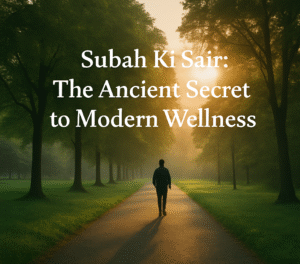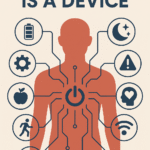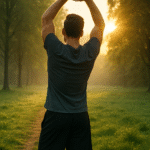There’s something magical about early mornings—the crisp air, the quietude before the day begins, and the rising sun painting golden hues across the sky. In India, elders have always emphasized “Subah ki sair karo, tandurust raho”—a morning walk ensures health and happiness. Today, science is catching up with what our ancestors knew all along: a morning walk is not just an exercise, but a holistic wellness ritual. Walking outside in fresh air very much beneficial than walking on a treadmill.
Whether you’re a fitness enthusiast, a stressed professional, a homemaker, or a student—this one habit can transform your mental, emotional, and physical health. In this blog, we explore why morning walks are powerful, how to start, tips to stay consistent, and even how walking outdoors improves spiritual and creative well-being.

🌄 1: The Ancient Indian Wisdom Behind Morning Walks
In Ayurveda and yogic traditions, walking in the Brahma Muhurta (around 4:30–6:00 AM) is considered one of the purest forms of movement. It’s a time when prana (life force) is high, and the environment is fresh and sattvic (pure and serene). Walking barefoot on grass is said to ground your energy (earthing) and strengthen your eyesight, nervous system, and immunity.
In olden days, before the invention of gyms, walking was the most natural way to stay active. Saints, Rishis, and commoners alike would begin their day by walking in silence, often accompanied by chants or mindfulness.
In today’s world of screens and stress, reviving this ancient habit can be a deeply healing act—not just for the body but also for the soul.
💪 2: Physical Benefits of a Morning Walk
A 30-minute morning walk daily can:
- Boost Cardiovascular Health: Walking strengthens the heart, lowers cholesterol, and improves blood pressure.
- Improve Digestion & Metabolism: Morning movement triggers the body’s digestive juices and metabolic functions.
- Help Weight Management: You burn calories and activate fat-burning hormones naturally.
- Strengthen Muscles & Joints: Gentle yet consistent use of muscles helps prevent arthritis and bone degeneration.
- Enhance Lung Capacity: Fresh morning air, rich in oxygen, supports deep breathing and lung function.
- Regulate Hormones: From insulin sensitivity to cortisol balance, walking has a direct effect on hormonal balance.
- Improve Skin Health: Sweating clears out pores and boosts blood circulation for that healthy glow.
Include hydration before your walk (Drink 1 to 3 glasses of water after you wake up) and gentle stretching after, to maximize these benefits.
🧘 3: Mental & Emotional Benefits
Many people walk for fitness, but the biggest transformation happens in the mind.
- Reduces Anxiety & Depression: Walking outdoors, especially around trees and birds, releases serotonin and endorphins—natural mood enhancers.
- Improves Sleep Quality: A morning walk resets your circadian rhythm and helps regulate melatonin.
- Boosts Creativity & Focus: Studies show people generate more ideas after a walk than sitting indoors.
- Enhances Mindfulness: Walking mindfully, observing your breath or footsteps, can be a meditative practice.
- Improves Emotional Stability: Regular walks give you space to process your thoughts, calm your emotions, and respond—not react—to life.
Tip: Leave your headphones at home once in a while and simply walk in silence. Notice how your body feels, how the air touches your skin, how nature speaks to you. Sometimes just hear the sounds of birds, sounds of trees in wind, squirrels around or just the natural sounds.
🌿 4: Spiritual and Creative Expansion
A morning walk can become a spiritual practice. Many sages practiced walking meditation, where every step was an offering. When you walk in the early hours, nature is in harmony—you’re walking not just through nature, but with nature.
This quiet time often becomes a portal for new ideas, deeper reflections, and creative downloads. Writers, poets, scientists, and philosophers like Aristotle and Steve Jobs used walking as a thinking tool. In the silence of dawn, inspiration often strikes.
🧭 Chapter 5: How to Start Your Morning Walk Routine
Getting started is simple:
- Set a Consistent Time: Aim for 30–45 minutes between 5:30 to 7:00 AM.
- Dress Comfortably: Wear light clothes and proper walking shoes.
- Stay Light on Stomach: Walk before breakfast or with just a light drink like lemon water.
- Choose a Natural Path: Parks, lakesides, or quiet roads are ideal.
- Warm Up: Gentle neck, shoulder, and ankle rolls.
- Stay Present: Don’t rush; breathe consciously and walk with awareness.
Sample Routine:
- 5:30 AM: Wake up and freshen up
- 6:00 AM: Walk in the park (30 minutes)
- 6:30 AM: Cool down + 5 minutes of deep breathing or gratitude
📅 6: Tips to Stay Consistent
- Have a Walking Buddy: Encourages you to show up. or you can select a tree or something that you will daily say Hi and comeback.
- Track Your Steps: Use apps like Google Fit or a smartwatch. Or a pathway or rounds in a park.
- Make it Enjoyable: Mix nature, podcasts, or mantras. Enjoy how other living things like birds, ants, etc… are waking up early and doing their work.
- Celebrate Progress: Notice mood, energy, and health improvements.
- Be Flexible: Even 15 minutes is better than none.
Remember, perfection is not the goal—consistency is.
🧓 7: Morning Walks for All Ages
Morning walks are age-friendly:
- Children benefit from outdoor play and energy regulation.
- Young Adults manage stress, anxiety, and screen fatigue.
- Middle-Aged Adults balance metabolism, weight, and hormone changes.
- Seniors improve mobility, memory, and social connection.
Walking is gentle, low-impact, and adjustable to all fitness levels. Even a slow-paced walk with rest breaks can offer remarkable benefits.
🌞 Summing up: Walk into a Better Life
Morning walks are a blessing we often take for granted. Just one step outside can change your energy, your mindset, and your future. In a world that’s running fast, slow down each morning, breathe, walk, and connect—with yourself and with life.
Subah ki sair is not just about physical health—it’s a ritual of renewal, a gateway to peace, and a gift to your future self.
So, tomorrow morning, take that step. Your body, mind, and soul will thank you.

